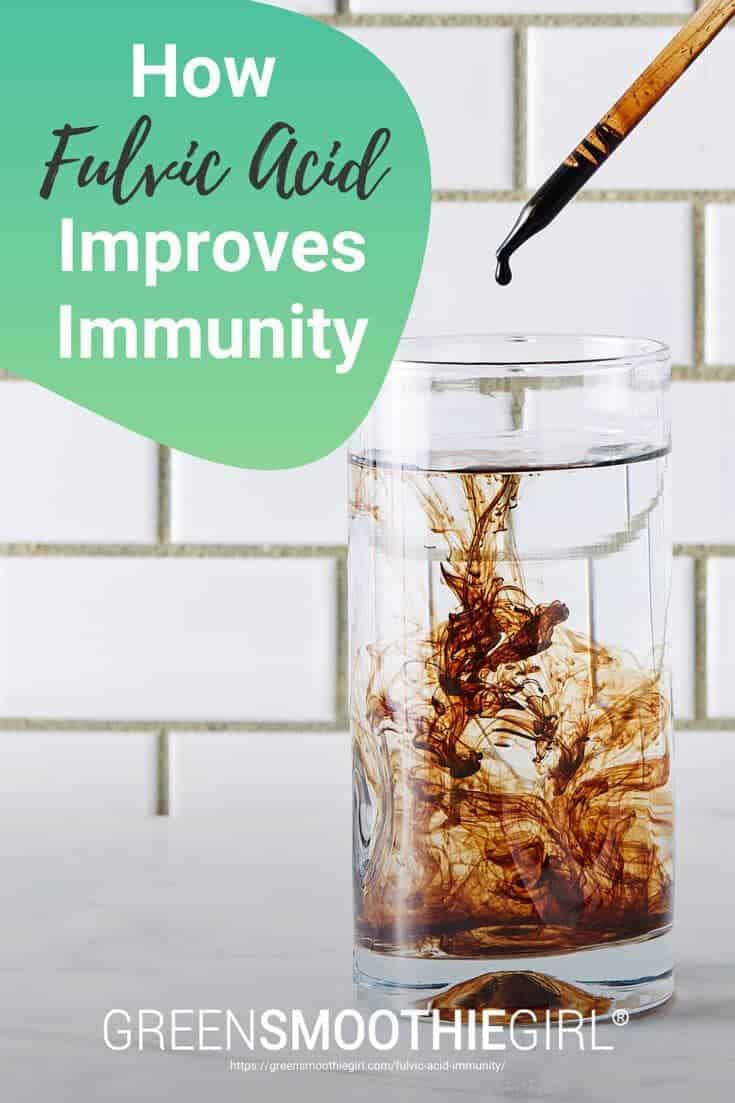5 Reasons You Need Minerals for Immunity (Because You’re Probably Not Getting Enough!)

Want to know a dirty little secret?
Dirt — prehistoric dirt, that is — is one of the best ways you can boost your baseline immune function and improve your overall health.
Hear me out: Fulvic acid, a substance formed by ancient plant life deep in the soil, supplies the vitamins, nutrients, and minerals (including trace minerals) in the produce we harvest and eat daily.
Study after study shows that supplementing with fulvic acid can significantly improve the immune system's ability to fight off pathogens, such as viruses and bacteria.
[February only! Our biggest sale of the year for our bestselling Ultimate Minerals – giving you the fulvic and humic minerals you need – for your immune system and daily health. Save on Results You'll Love.]
In this article:
- What Is Fulvic Acid?
- 5 Ways Fulvic Acid Improves Immunity
- Fulvic Acid Vs. Multivitamins for Boosting Immunity
- Are You Getting Enough Fulvic Acid In Your Food?
- Supplementing with Fulvic Acid
What Is Fulvic Acid?
You might think you haven’t heard of fulvic acid before – or perhaps you’re confusing it with folic acid, which is a B vitamin.
But don’t let the strange-sounding name fool you.
Fulvic acid is the original source of nearly every other vitamin and mineral that makes its way into the produce we eat, which in turn fortifies our bodies against disease.
The vitamin C in oranges? The selenium in Brazil nuts? The iron in spinach? It all came from the soil, where decomposing plant life turned into rich humus and released byproducts called humic acids, including fulvic acid.
The millions of microbes in fulvic acid work together with plant roots to extract all those inorganic minerals and nutrients from the soil and convert them into organic, ionic minerals and trace minerals for the plant in a highly usable form (which, uncoincidentally, is the same form our bodies use most easily!)
[Related: How Your Body Uses Humic And Fulvic Acids]
5 Ways Fulvic Acid Improves Immune Protection
Every organ and every function in our body depends on vitamins and minerals.
Produce rich in fulvic acid delivers the life-sustaining raw materials that fuel our cells and organs on every level.
And when we’re deficient in vitamins and minerals (because we’re not getting enough from bioavailable sources), we see the results in reduced immune function, inflammation, and disease.
Fulvic acid can improve immunity against pathogens and disease:
- Fulvic Acid Is A Powerful Antiviral
Fulvic acid is a potent antiviral and can guard against immune threats and speed up healing from many different pathogens.
Studies have shown its effectiveness in battling numerous viruses including polio virus,2 herpes, influenza A, and Coxsackie A9.3 In one study, participants who supplemented with fulvic acid were able to beat the common cold significantly faster.4
- Lowers Baseline Inflammation
When the atoms in our cells are damaged by UV rays, poor diet, or chemical load, they become free radicals.
These unstable atoms cause damage throughout the body and can lead to inflammation and stress as the body diverts resources to run damage control.
Fulvic acid neutralizes those free radicals and has been shown to significantly reduce inflammation,5 freeing up the body’s resources to battle outside invaders and pathogens — instead of internal threats!
- Improves Circulation for Faster Antibody Response
Fulvic acid helps improve circulation4 and blood flow for every cell in your body— which means better coverage of circulating antibodies.6
And antibodies circulating efficiently throughout the body means a faster response when an outside threat attempts to gain a foothold in the body!
- Corrects Body PH
Contrary to what its name implies, fulvic acid is very alkaline.
So many of us have a highly acidic body pH as a result of poor diet and processed foods—which makes it difficult for our cells to grow, reproduce, and fight off pathogens.
Fulvic acid can set the stage for a less acidic environment that allows our cells and organs to respond effectively to immune threats.
- Helps Heal the Gut
Fulvic acid is filled with good bacteria7 (probiotics).
A diverse, healthy microbiome is not only vital to prevent pathogens from getting a foothold but is also key to creating the short-chain fatty acids that directly impact your dopamine levels8 (which are vital to mounting an effective immune response9 on a cellular level!)
Fulvic Acid Vs. Multivitamins for Boosting Immunity
We all know that our bodies use the minerals and nutrients in fruits and vegetables for a wide variety of immune functions.
For instance, our killer-T cells and phagocytes require copper, selenium, and zinc to effectively fight off bacteria and viruses.10
So, why not just double down on taking a multivitamin?
Because the vitamins, minerals, and nutrients found in living produce are much more bioavailable11 (aka, our bodies can readily use them) than processed, powdered vitamins, that our bodies have trouble absorbing. Why? The answer revolves around the fulvic acid in plant foods, which can easily cross cell membranes.
Here’s the science:
Fulvic acid is one of the densest sources of bioavailable nutrients (upwards of 75 different minerals, trace minerals, electrolytes, vitamins, and amino acids!) on the planet.
Its unique molecular structure allows it to transform colloidal minerals (larger molecules that can’t cross cell membranes easily) into water-soluble, ionized fulvic minerals (smaller molecules that can readily cross cell membranes).
Incredibly, that unique molecular structure of fulvic acid allows it to carry 60 times its own weight in nutrients — right into our cells.
Are You Getting Enough Fulvic Acid In Your Food?
Unfortunately, the answer to this question is, “Probably not.”
Modern agricultural practices like genetic modification, reliance on chemical fertilizers, strip farming, and mass production mean that we are stripping the soil of rich humus (and fulvic acid!).
The bottom line is that in most parts of the world, fruits and vegetables are far less nutrient dense than fruits and vegetables two hundred years ago.
Even those of us who eat a whole foods, minimally processed, plant-based diet are at risk of being deficient in key vitamins and minerals.
We see it in the rise of all forms of disease, autoimmune disorders, and inflammatory conditions.
Supplementing with Fulvic Acid
Supplementing with a concentrated fulvic acid supplement can help balance the lack of immune-boosting minerals and nutrients in modern fruits and vegetables.
Make sure that when choosing a supplement, you opt for one that is free of all fillers, preservatives, and heavy metals.
Keep in mind that when you start taking fulvic acid, your body may go into detox mode with the new infusion of minerals and vitamins.
Some initial cramping, gas, or bloating is normal and temporary. To help ease these symptoms, it’s a good idea to start slow with supplementing and titrate up.
If you are immunocompromised or pregnant, make sure you talk to your doctor first before you jump right into supplementing (since your body’s immune response is already on high alert!).
Other GreenSmoothieGirl Content on Building Immunity:

Disclosure: This post may contain affiliate links that help support the GSG mission without costing you extra. I recommend only companies and products that I use myself.
Resources
- Schepetkin IA, Xie G, Jutila MA, Quinn MT. Complement-fixing activity of fulvic acid from Shilajit and other natural sources. Phytother Res. 2009;23(3):373–384. doi:10.1002/ptr.2635
- Sobsey MD, Hickey AR. Effects of humic and fulvic acids on poliovirus concentration from water by microporous filtration. Appl Environ Microbiol. 1985;49(2):259–264.
- Haynes, Antony BA, RNT. “Review of Humid Acid.” Clinical Education. May, 2016.
- Yinzhang Cui, Humic Acid, 1 (1991)
- Winkler J, Ghosh S. Therapeutic Potential of Fulvic Acid in Chronic Inflammatory Diseases and Diabetes. J Diabetes Res. 2018;2018:5391014. Published 2018 Sep 10. doi:10.1155/2018/5391014
- Nicholson LB. The immune system. Essays Biochem. 2016;60(3):275–301. doi:10.1042/EBC20160017
- Swidsinski A, Dörffel Y, Loening-Baucke V, et al. Impact of humic acids on the colonic microbiome in healthy volunteers. World J Gastroenterol. 2017;23(5):885–890. doi:10.3748/wjg.v23.i5.885
- Ridaura V, Belkaid Y. Gut microbiota: the link to your second brain. Cell (2015) 161:193–4. 10.1016/j.cell.2015.03.033
- IOS Press BV. (2012, October 11). New model explains role of dopamine in immune regulation. ScienceDaily. Retrieved March 18, 2020 from www.sciencedaily.com/releases/2012/10/121011123740.htm
- Institute of Medicine (US) Committee on Military Nutrition Research. Military Strategies for Sustainment of Nutrition and Immune Function in the Field. Washington (DC): National Academies Press (US); 1999. 16, Trace Minerals, Immune Function, and Viral Evolution..
- Suttekiti Maruyama (1934) Isolation of Vitamin C from Vegetables and the Relations between Vitamin C and Ascorbic Acid, Journal of the Agricultural Chemical Society of Japan, 10:10-12, 184-192, DOI: 10.1080/03758397.1934.10857103
Disclosure: This post may contain affiliate links that help support the GSG mission without costing you extra. I recommend only companies and products that I use myself.
Posted in: Health Concerns, Holistic Care, Immunity, Natural Products, Supplements

















